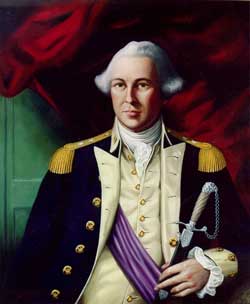Get Today in Masonic History into your Inbox. Sign up today for one of our email lists!
Need an article for your Trestleboard/Newsletter see our Use Policy
Joseph Warren Passes Away

Today in Masonic History Joseph Warren passes away in 1775.
Joseph Warren was an American physician and Revolutionary War leader.
Warren was born on June 11th, 1741 in Roxbury Province of Massachusetts Bay. When Warren was 14, his father was killed when he fell off a ladder while working his orchard. Warren attended the Roxbury Latin School and eventually enrolled in Harvard College. He graduated in 1759. He later studied medicine.
In 1764, Warren married. His wife passed away in 1772. The couple had four children.
In 1770, Warren conducted an autopsy of Christopher Seider. He was an 11 year old boy who many feel was the first casualty of the American Revolution. Seider's funeral led to the Boston Massacre.
As tensions grew with England, Warren was appointed to the Boston Committee of Correspondence. The Committees of Correspondence were essentially a shadow government American patriots set up in the months leading up to the Revolutionary War. He also drafted a document called the Suffolk Resolves which were endorsed by the Continental Congress. The documents purpose was to stand against the intolerable acts. He was also appointed as the president of the Massachusetts Provincial Congress, the highest position in the revolutionary government.
In April of 1775, Warren was one of only two top members of the Committee of Correspondence left in Boston. News spread quickly about General Thomas Gage's plan to march to Concord to destroy munitions. Warren, on April 18th, received word from a highly placed spy in the British ranks, some believed it was Gage's wife, Gage intended to arrest Samuel Adams and John Hancock. Warren sent William Dawes and Paul Revere on their famous midnight rides to warn Hancock and Adams.
On April 19th, Warren was able to slip out of Boston. He joined the battle of Lexington and Concord. There he led the militia in attacks against British Troops as they returned to Boston. He was almost killed in the fighting when a musket ball hit part of his wig.
On June 17th, 1775 Warren was killed while fighting for Breeds Hill. The fighting was heavy and he was killed instantly when shot in the head by a British Officer who recognized him. His body was stuffed into a shallow grave after being stabbed and mutilated with a bayonet. Two days after Warren's death another British officer returned to the grave site, removing Warren from the grave and further attacking the body. He jumped on his stomach and spit in his face. Later Revere and Warren's brother recovered the body and properly buried him.
Warren was a member of St. Andrew Lodge in Boston. After joining the lodge he became part of the Sons of Liberty a Revolutionary organization formed just before the beginning of the War.
This article provided by Brother Eric C. Steele.

